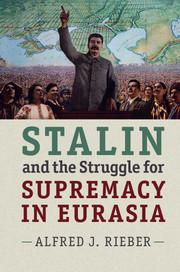Book contents
- Frontmatter
- Dedication
- Contents
- List of maps
- Acknowledgments
- List of abbreviations
- Introduction
- 1 Stalin, man of the borderlands
- 2 Borderlands in Civil War and Intervention
- 3 The borderland thesis: the west
- 4 The borderland thesis: the east
- 5 Stalin in command
- 6 Borderlands on the eve
- 7 Civil wars in the borderlands
- 8 War aims: the outer perimeter
- 9 War aims: the inner perimeter
- 10 Friendly governments: the outer perimeter
- Conclusion: A transient hegemony
- Index
4 - The borderland thesis: the east
Published online by Cambridge University Press: 05 September 2015
- Frontmatter
- Dedication
- Contents
- List of maps
- Acknowledgments
- List of abbreviations
- Introduction
- 1 Stalin, man of the borderlands
- 2 Borderlands in Civil War and Intervention
- 3 The borderland thesis: the west
- 4 The borderland thesis: the east
- 5 Stalin in command
- 6 Borderlands on the eve
- 7 Civil wars in the borderlands
- 8 War aims: the outer perimeter
- 9 War aims: the inner perimeter
- 10 Friendly governments: the outer perimeter
- Conclusion: A transient hegemony
- Index
Summary
The renewed campaign against the national opposition among Muslims in the second half of the 1920s was yet another skein of plots that Stalin wove entangling internal enemies and foreign governments. He was increasingly concerned by the persistence of a Muslim “religious movement” based on the schools and the economic influence of the mullahs. But he was still cautious about launching a massive anti-religious campaign against Islam. In secret, however, in December 1927 Sultan-Galiev was arrested for the second time. Further arrests and a widespread purge of Tatar Bolsheviks followed. This time there was to be no thought of leniency. Genrikh Yagoda was put in charge of cooking up a case. Sultan-Galiev and his associates were falsely accused and condemned for forming a “counter-revolutionary program…that included the formation of a Turanian government”; this was not just a “federation with statist tendencies” as had been alleged in 1923, but implied the greater crime of aspiring to foster the dissolution of the Soviet Union. After a long struggle against Crimean Tatar nationalists, “a party within a party” with a national program of “the Crimea for the Crimean Tatars,” the president of the Crimean Central Executive Committee, Veli Ibragimov, was arrested in January 1928 and then shot.
Ethnic tensions caused by indigenization and social conflict aroused by collectivization proved an explosive mixture throughout the South Caucasus. In October 1931, the OGPU reported a serious rise in cross-border banditry linked to resistance to collectivization, fed by rumors of the collapse of Soviet power and supported by the Iranian government. The general political situation in the Caucasian Federation of Azerbaizhan, Georgia and Armenia was especially troublesome. Union party officials ignored or discriminated against the interests of local minorities. In the summer of 1931 several thousand “Turkic” families resettled across the frontier with Turkey. Most serious of all, a massive armed uprising broke out in the Nakhchevan Autonomous Republic caused by violent “excesses” in the drive to collectivize. Among the participants were poor peasants, workers and party and Komsomol members. The organizers of an uprising in Abkhaziia demanded that local Islamic traditions and economic activities be respected and not identified with kulaks. In 1931 the leading party organs of the federation were still pressing ahead vigorously in their efforts to carry out the principles of indigenization despite the obstacles, which they freely admitted.
- Type
- Chapter
- Information
- Stalin and the Struggle for Supremacy in Eurasia , pp. 126 - 151Publisher: Cambridge University PressPrint publication year: 2015



